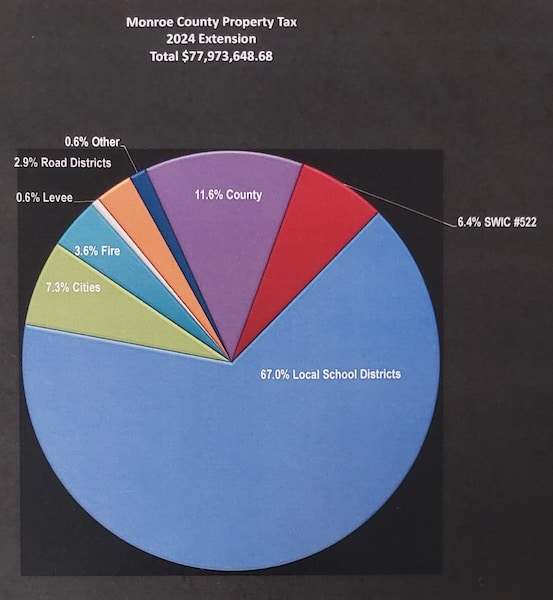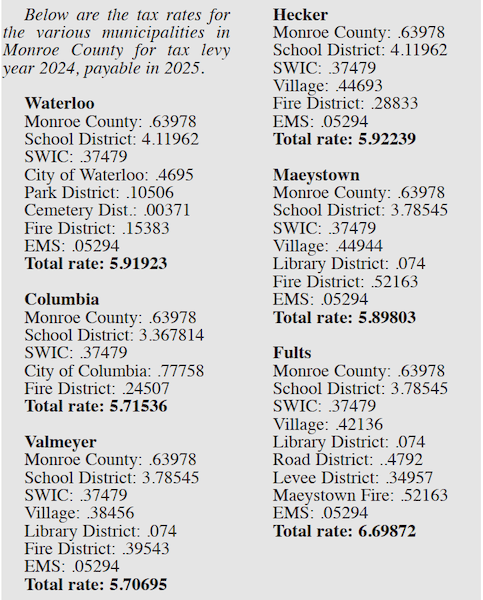Tax bills explained

Tax bills for 2024 payable in 2025 should arrive in local mailboxes by next week at the latest, according to Monroe County Treasurer Kevin Koenigstein.
As of press time, the county’s 18,176 tax bills were being printed, Koenigstein told the Republic-Times, and they should be mailed this week.
The grand total of those bills is just shy of $78 million, with total taxes to be collected later this year just over $4 million more than the $73.6 million collected in 2024.
Despite the increase in total dollars to be collected, tax rates for all municipalities are lower than the previous tax cycle.

The overall rates for Waterloo, Columbia and Valmeyer residents decreased between 2-5 percent.
With the Waterloo School District being a major exception, rates for almost all taxing entities individually are lower compared to last year. For example, the tax rate to fund Monroe County government is down to .63978 for the current collection compared to .69983 for last year’s collection.
While some taxing bodies, such as Monroe County and the Waterloo Fire District, levied a lower amount in Fiscal Year 2024 compared to 2023, the main reason for lower rates is a significant increase in county property values established in the latest assessment.
With the tax rates down and property values up, most taxpayers should still expect to pay more than last year, depending on how much a property’s valuation increased during the most recent assessment.
In 2022, assessed valuation for all properties topped $1 billion for the first time in Monroe County history, with the total jumping to $1.23 billion in 2023.
Those figures reflect only a fraction of taxable properties’ fair market value, with equalized assessed valuation based on a number of factors such as if a property is used as a primary residence, business or farmland.
Properties owned by federal, state and local governments or educational, religious or charitable entities and used exclusively for those purposes are exempt from paying property taxes.
The assessed value of all properties in the county once again made a significant leap, increasing another 8.97 percent in 2024 and bringing the total taxable value to $1.34 billion.
However, the rate of property value growth is greater than the 5.6 percent increase in total taxes to be collected compared to last year, leading to a lower tax rate overall.
The other taxing body which saw an increase was the Maeystown Rural Fire Protection District, an insignificant .002 percentage point increase representing a levy increase of just over $10,000 compared to last year.
The Waterloo School District will be receiving substantially more tax money this year – just under $3 million – compared to last year.
The Waterloo School Board held a public hearing in December due to the levy request increase of 11.09 percent exceeding the 4.99 percent annual increase allowed under the Property Tax Extension Limitation Law.
Despite the school’s levy request of $29.1 million for the current tax collection compared to $26.2 million last year, the rate itself only jumped about .04 percentage points – 4.12 percent – during this cycle and 4.08 percent in 2024.
For comparison, the Columbia School District increased its tax levy just under $800,000 this year for a total of $18,369,493.96
The Columbia district’s tax rate for the current tax cycle is 3.68 percent.
The rate increase for Waterloo schools was hampered by an astounding 10.2 percent overall assessed valuation of properties in the district.
Waterloo Superintendent of Schools Brian Charron spoke with the Republic-Times about the need for extra funding.
He began by pointing out the tax rate is “about the same,” but admitted, “like everything else, the operating cost has increased significantly.”
Recent capital projects such as a major expansion at Zahnow Elementary School last year notwithstanding, Charron said a major contributor to the hefty levy is the cost of labor – specifically school staff.
In addition to a significant rise in overall inflation over the past few years, Charron explained minimum wage in Illinois has increased more than 50 percent in the past five years.
Minimum wage has risen from $9.25 at the beginning of 2020 to $15 at the beginning of 2025.
Charron said that increase alone has created a notable rise in the cost of keeping and retaining non-certified staff, an area he admitted the district has been “struggling” with in recent years.
He added the Waterloo School Board has made “competitive pay” a priority to show a “commitment to non-certified employees” in the district.
Charron said the same principle applies to the teaching staff throughout the district’s five schools, with salary increases needed to attract and retain teachers.
Even with attempts to make teaching salary a compelling factor for choosing employment with the district, Waterloo ranked 188th of 245 schools in the state with enrollment between 1,000-2,999 in beginning salary for a certified teacher with a bachelor’s degree, according to a 2024-25 school year teacher salary study conducted by the Illinois State Board of Education.
Charron concluded by reminding taxpayers the school district is beholden to a maximum tax rate – approved by voters – which it operates under while creating budgets.
From 2010-2012, the Waterloo district’s total tax levy decreased over $1 million, with the low mark of $16,342,800 set in 2012.
At that time, superintendents in all local districts had warned taxpayers that changes in the state’s school funding formula and underpayment of promised funds would shift more of the burden to property tax revenue.
Since 2017, the school’s budget has increased over $1 million ever year but two, growing nearly $9 million in the past eight years.
Despite almost $3 million in extra taxes from the Waterloo School District alone added to the current tax bills, the overall tax rate for City of Waterloo residents fell to 5.92 percent this year compared to 6.09 percent last year.
Owners of taxable parcels in Monroe County will owe their first installment by Sept. 19 and their second installment by Nov. 14.
Residents may pay their entire tax bill in their first installment and prior to the due date, if they wish.
County taxpayers may also pay bills online and find more information about the current property tax collection cycle at monroecountyil.gov.






